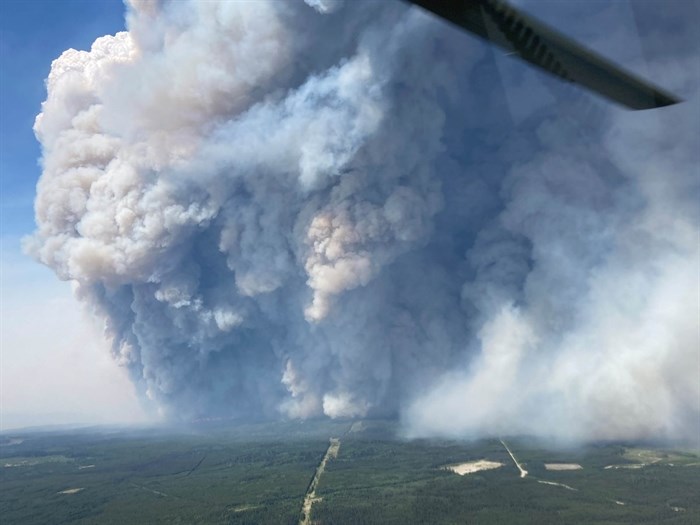
An aerial view of the Donnie Creek wildfire south of Fort Nelson, June 12, 2023.
Image Credit: SUBMITTED/BC Wildfire Service
June 14, 2023 - 4:30 PM
VANCOUVER - Scattered rain across parts of British Columbia is welcome in the fight against wildfires, but it would take a week of sustained precipitation to extinguish the risk, an official with the BC Wildfire Service said.
That's not in the forecast, said operations director Cliff Chapman, although the recent showers gave crews an opportunity to use suppression tactics on several blazes in the northeast, including a massive fire burning within two kilometres of the Alaska Highway.
Over the long term, he said, underlying drought means it won't take much warming to return the landscape to conditions "very prone" to ignition and spread of wildfires.
"Coming out of the winter with drought, breaking temperature records in late April, early May, doing it again in June … we're in a tricky spot," Chapman said.
The wildfire service is expecting up to 20 millimetres of rain in parts of B.C. over the coming days, and that could help in the short term, he said.
"But it won't be enough to knock down the hazard as we enter into July and August, which typically set up as our warmer, drier, hotter months."
The BC Wildfire Service reports more than 80 active wildfires across the province on Wednesday, including four "wildfires of note" that are highly visible or pose a potential threat to public safety.
Forests Minister Bruce Ralston said fires have scorched 7,620 square kilometres of land since April, mostly in the northeast, dwarfing the 20-year average of 180 square kilometres at the same stage of the season.
Chapman said the province currently has enough capacity to manage the situation, although the wildfire service has notified the Canadian Interagency Forest Fire Centre that it might need more support over the coming weeks.
An incident management team could arrive from the United States as soon as this weekend to provide some rest for one of six B.C.-based teams, he said.
The Peace River Regional District has posted an evacuation alert for a stretch of the Alaska Highway that connects Yukon and northern B.C. to the rest of the province as the 4,875-square-kilometre Donnie Creek fire burns south of Fort Nelson.
If the out-of-control blaze — the second biggest in B.C. history — cuts the highway, some northern residents could face a detour of more than 1,700 kilometres if they need to travel south on main roads.
Little rain from recent storms reached the Donnie Creek blaze on Tuesday, but downpours around the community of Dawson Creek calmed the nearly 200-square-kilometre Kiskatinaw wildfire that's burning within a few kilometres of the community of Tumbler Ridge, which was evacuated six days ago.
More than 2,750 people are currently under evacuation orders in Tumbler Ridge, the Peace River Regional District and the Northern Rockies Regional Municipality, Minister of Emergency management Bowinn Ma said Wednesday.
Ma encouraged all B.C. residents to register with the province's Emergency Support Services program, saying evacuees who are registered will be processed more quickly at reception centres and be able to get help right away.
The Chief of the Doig River First Nation near Fort Nelson said the Donnie Creek fire has claimed a handful of trapline cabins, and people are working to protect others.
Chief Trevor Makadahay said Tuesday that his community is as ready as it can be to evacuate if winds push flames from the north.
Residents, especially elders, are staying indoors and using air purifiers to cope with the heavy wildfire smoke blanketing the area, he said.
On Vancouver Island, the wildfire that forced closure of the main highway connecting communities including Port Alberni, Tofino and Uclulet with the rest of the region is now classified as "being held," meaning it's not likely to spread beyond the predetermined boundaries under current conditions.
Wildfire crews have been establishing control lines around the roughly two-square-kilometre blaze that sent debris tumbling onto the highway east of Port Alberni.
Safety concerns are expected to keep the stretch of Highway 4 closed until at least June 24, officials announced Tuesday.
A lengthy and challenging detour is being used to allow people and supplies to reach the cut-off communities, but it's meant to be used only for essential travel.
Janelle Staite with the Ministry of Transportation and Infrastructure said the detour is working "very effectively," with convoys of trucks delivering supplies daily.
"We've been given the OK from (the) BC Wildfire Service to start some clean-up work below the fire slope, which is setting us on the trajectory to be able to re-open Highway 4 to single-lane alternating traffic by next weekend," she said Wednesday.
This report by The Canadian Press was first published June 14, 2023.
News from © The Canadian Press, 2023